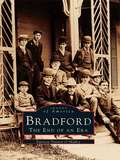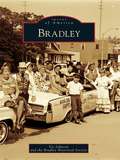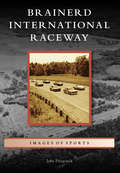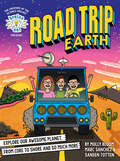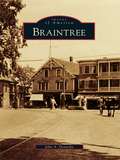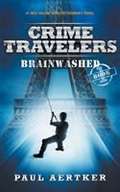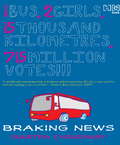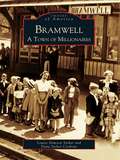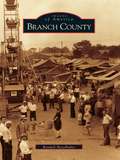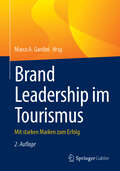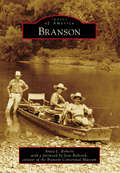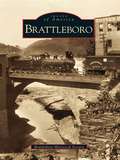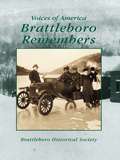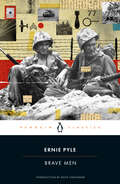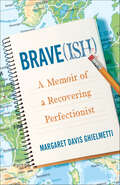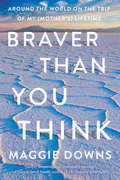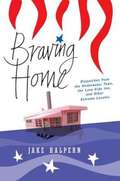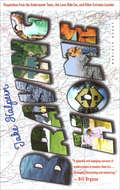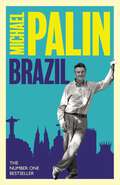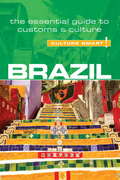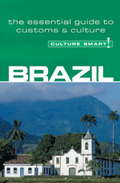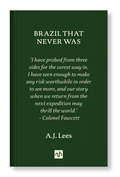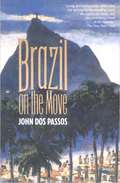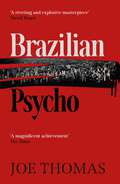- Table View
- List View
Bradford: The End of an Era
by Patricia Trainor O'MalleyFor more than 225 years, the town of Bradford, Massachusetts, led an independent life on the Merrimack River. Stately homes lined its main roads, a classic New England common graced its center, and high on a hill stood Bradford Academy, the town's best-known institution. In November 1896, Bradford's long independence came to an end when the town's voters agreed to annexation by the city of Haverhill. Through the camera's eye, readers can stroll through the old town from the bridge to the Common, east along Salem Street and west to the railroad depot. They can visit Ward Hill, the once-sleepy farming community whose transformation to a planned factory village triggered the annexation.
Bradley (Images of America)
by Vic Johnson Bradley Historical SocietyAt the age of 49, Ohio-born J. Herman Hardebeck had earned a gilt-edged reputation as a real estate developer in Kankakee. In the spring of 1891, to the north of Kankakee and south of Bourbonnais, lay a flat, mile-wide prairie. The land stretched eastward from a grove of Kankakee river timber, past the Illinois Central Railroad into the watershed of Soldier Creek. In May, Hardebeck signed agreements with Alvah Perry and Hiram Goodwin for the purchase of 340 acres of this property. He had taken options on additional tracts. Here Hardebeck would establish an industrial community first named North Kankakee and later renamed Bradley in honor of farm implement manufacturer David Bradley.
Brainerd International Raceway (Images of Sports)
by John FitzgeraldIf it has an engine and anything close to two wheels, Brainerd International Raceway has hosted a race for it. From sports cars, stock cars, drag racers, and the Can-Am Racing Series to motorcycles, snowmobiles, and chump cars, Brainerd International Raceway has been the northern outpost for exciting track action and infield get-togethers since 1968. It has been called one of the best-constructed tracks in the nation, and with several hairpin turns, a backfield with an undulating, curved spine, and a mile-long straightaway on which racers hit speeds of as much as 200 miles per hour, it certainly is one of the finest in the country.
Brains On! Presents...Road Trip Earth: Explore Our Awesome Planet, from Core to Shore and So Much More
by Molly Bloom Marc Sanchez Sanden TottenThe creators of the award-winning science podcast for kids, Brains On!, take readers on a humorous, highly illustrated, fact- and fun-filled journey through Earth—from the core, to the outer atmosphere, and everywhere in between. Perfect for STEM enthusiasts!Did you ever wonder why volcanoes erupt? Or why the ocean is salty? How about why no two snowflakes are the same?Embark on an epic road trip to find the answers to these burning questions and more! The Brains On! team is traveling from deep inside the earth, through the oceans, the land, the clouds, and even into the outer atmosphere in their high-tech ride—to uncover the coolest facts, strangest mysteries, and most incredible marvels of our planet.Packed with scientific research, mind-boggling trivia, and laugh-out-loud jokes, this highly illustrated fact-filled exploration of the earth promises a brain-bending, jaw-dropping, belly-laughing good time that curious kids and budding scientists won&’t be able to resist.Turn your BRAINS ON! with more books and check out:Brains On! Presents...It's AliveBrains On! Presents...Earth Friend Forever
Braintree
by John A. DennehyFirst settled in 1634, and incorporated in 1640, the Town of Braintree has a long and distinguished history. "Old Braintree," which originally encompassed what is now Braintree, Quincy, Randolph, and Holbrook, was the birthplace of John Adams, John Hancock, John Quincy Adams, and Sylvanus Thayer. Primarily a farming community for almost three centuries, Braintree was also home to a number of water-powered mills and businesses, which prospered along the banks of the Monatiquot River. With the arrival of the railroad in the mid-19th century, several manufacturing plants were built near South Braintree Square. Farming and manufacturing have since been replaced by white-collar businesses and retail establishments. Since World War II, Braintree has become home to a larger and increasingly diverse residential and business population, due in part to its proximity to Boston and three major highways. Braintree presents images from the archives of the Braintree Historical Society and includes many previously unpublished photographs.
Brainwashed (Crime Travelers #1)
by Paul AertkerWhile sleeping on the roof of his father’s hotel, thirteen-year- old Lucas Benes finds a baby alone and learns that the Good Company has restarted its kidnapping business. Brainwashed (Crime Travelers #1) tracks the secret urban adventures of the New Resistance, a network of international teenage spies.
Braking News
by Sunetra ChoudharyFor two months prior to the general elections in May 2009 NDTV anchor and TV reporter Sunetra Choudhary, along with her colleague Naghma Sahar, clambered onto a bus equipped with some Club Class seating, the requisite machinery to beam out live from the remotest parts of India, and a motley crew of cameramen and engineers. Notching up 200 kilometres a day, she and her colleagues trundled the bylanes and boondocks of Bharat in search of the elusive Indian voter, and an insight into his mind. Lurching into villages without electricity in UP, to tribal settlements in Jharkand, to Baripada in Orissa and Kanchipuram in Tamil Nadu they beamed out a daily show called the Election Express, that spoke one on one with the locals and tried to understand the issues that determined their lives.Part travelogue, part election special, part candid confessions of an inveterate TV camera-time junkie, this book is a delightfully frank account of one woman?s understanding of why the country voted as it did; and how obvious it is, once out of the larger cities that development is the ultimate vote-getter.
Bramwell: A Town of Millionaires
by Louise Dawson Stoker Dana Stoker CochranBramwell, "the pride of West Virginia's southern tip," sprang up almost overnight as a result of the 1800s coal-mining boom. It boasted more millionaires per capita than any other town in this country. These vintage photographs tell of devastation by the 1890 flood and the 1910 fire. In 1957, a warm January caused the Bluestone River to cover Main Street and limited transportation to rowboats. Herein, stories unfold of the early days when coal was king and cash flowed as freely as the river. A few old-timers remember watching the bank janitor as he pushed a cart full of money down Main Street to the train station every week. The bankfinanced Washington's Burning Tree Country Club and the University Women's Club. By the start of World War II, Bramwell's "millionaires" were the students attending Bramwell School. This volume includes photo memories showing how the school and community were joined at heart.
Branch County
by Randall HazelbakerBranch County, home to the historic communities of Bronson, Union City, Quincy, Coldwater, and Sherwood, was named for John Branch, President Jackson's Secretary of the Navy. The original county seat was Masonville, in 1830, followed by the Village of Branch in 1831, and finally, Coldwater, in 1842. By 1836 there were 30 inns between Sturgis and Quincy along the Sauk Trail. Railroads first traveled through Branch County in 1850, and the presence of trains facilitated further growth and settlement. Individuals in Branch County accumulated wealth by selling horses, participating in the burgeoning cigar industry, and producing agricultural goods. The county is divided into 16 townships, and this book details the history of each city, village, and small settlement. Author Randall Hazelbaker shares images and memorabilia from his vast personal collection to document and celebrate the development of Branch County.
Brand Leadership im Tourismus: Mit starken Marken zum Erfolg
by Marco A. GardiniDieses Buch beschäftigt sich mit der Frage, was starke Tourismusmarken auszeichnet und wie man erfolgreiche Marken im Tourismus aufbaut: Mit welchen Strategien, Techniken und Aktivitäten erarbeitet man sich einzigartige Profilierungs- und Markenleistungen als Brand Leader in seinem Wettbewerbssegment? Wie etabliert man eine Vertrauensbasis zum Kunden und baut sich dadurch langfristige, loyale und damit profitable Kundenbeziehungen auf? Wie schafft man es, mit der gewählten Markenstrategie und den entwickelten Marken für die anvisierte Zielgruppe in der jeweiligen Tourismusbranche relevant zu sein bzw. zu bleiben? Renommierte Autoren aus Wissenschaft und Unternehmenspraxis behandeln diese und zahlreiche weitere Fragen in ihren unterschiedlichen Dimensionen und arbeiten theoretisch fundiert und praxisrelevant die Besonderheiten einer professionellen Markenführung im Tourismus auf. Das Spektrum der Beiträge reicht von theoretischen Grundlagen, Einzelinstrumenten und Methoden der Markenführung, Fallstudien und Umsetzungserfahrungen bis zu Interviews mit Top-Führungskräften aus der Tourismusindustrie. Dieser Sammelband richtet sich in erster Linie an Managementpraktiker und soll den Leser zum Nachdenken, Weitermachen und Weiterentwickeln inspirieren. Das Buch eignet sich aber auch als auch als Grundlage für Vorlesungen zum Tourismusmarketing sowie als Quelle zur Anregung weiterer Forschung im Bereich des Markenmanagement im Tourismus.
Branson
by Anita L. Roberts Jean BabcockIn 1939, Branson was described as "the paradise of the Ozarks--the playground of America." Originally home to the Osage, the harsh rocky terrain made homesteading difficult. The Ozarks's wilderness became a hideout for bushwhackers following the Civil War. The masked "Bald Knobbers" developed as vigilantes to defend mountain families. Today, the "Baldknobbers" are known as Branson's first musical show. In 1894, tours began in Marble Cave, one of 8,000 Ozarks caves. Now known as Marvel Cave, it boasts the largest cave entrance room in the United States and remains a main attraction at Silver Dollar City's theme park. Many visitors are lured by the natural beauty, healthful atmosphere, and recreational activities offered in the Ozarks. Harold Bell Wright penned The Shepherd of the Hills while recuperating here at the beginning of the 20th century. A wave of tourism to the Branson area followed its 1907 publication. Today, the "Live Entertainment Capital of the World" welcomes more than eight million visitors yearly.
Brattleboro
by Brattleboro Historical SocietyBrattleboro, lies in the southeast corner of Vermont, just nine miles north of the Massachusetts border and directly across the Connecticut River from New Hampshire. The community developed in the 1760s, when European American settlers established homes in the river valley. Brattleboro was ideal for settlement because of its topography. The Whetstone Brook, which runs from the foothills of the Green Mountains through Brattleboro, provided a major source of waterpower, and the Connecticut River offered an ideal transportation route for sending finished products via flat-bottomed boat to market in southern New England and New York. Brattleboro presents the story of its people, who from the beginning have exhibited and benefited from a positive philosophy toward life. In the mid-1800s, railroad service came to the area and Brattleboro developed as a center for commerce, health spas, and literary activities. Factories manufacturing organs, toys, and furniture thrived. Printing and publishing industries, as well as literary societies flourished. Hotels opened, and visitors arrived to do business or just to avail themselves of the town's many advantages. To this day, the area continues to enjoy a stable economy.
Brattleboro Remembers
by Brattleboro Historical SocietyFamily stories are a part of oral history. They are told to inform younger generations about events heretofore not recorded. Brattleboro Remembers is a collection of such stories accompanied by the rich assortment of historical photographs that stirred these memories of earlier days in the southeastern corner of Vermont.Brattleboro Remembers emerged as a result of writing workshops sponsored by the Brattleboro Historical Society and made possible by a grant from the Council on Aging for Southeastern Vermont. The workshops, facilitated by poet and writing partner Verandah Porche, took place on winter Sunday afternoons. The walls of the room in which the group met were covered with copies of historical photographs. The workshop participants, most of whom still live in Brattleboro, selected photographs that brought back strong recollections. After studying an image, they wrote autobiographical pieces based on what came to mind. For those shy about putting pen to paper, volunteer scribes were on hand to listen to the stories and help the participants get their reminiscences down on paper.
Brave Men
by Ernie PyleThe classic, human-scale account of the soldiers who fought in World War II, by Pulitzer Prize winner Ernie Pyle—America&’s most famous and most loved war correspondent—featuring a new introduction by David Chrisinger, the author of the new Ernie Pyle biography, The Soldier's Truth A Penguin ClassicWhen America entered World War II, Ernie Pyle followed the soldiers into the trenches. Long before television and the internet beamed combat footage directly to us, his dispatches from the front lines augmented the coverage of the war&’s politics, strategies, and macro-level mobilizations to give the American public what he called his &“worm&’s-eye view&” of the day-to-day life of the war. He captured, as John Steinbeck described it in Time magazine, the &“war of the homesick, weary, funny, violent, common men who wash their socks in their helmets, complain about the food . . . and bring themselves through as dirty a business as the world has ever seen and do it with humor and dignity and courage—and that is Ernie Pyle&’s war.&” A number-one bestseller upon its publication in 1944, Brave Men remains unmatched in its clarity, sympathy, and grit as a portrait of America&’s boys who fought in Europe, and lives on as a testament to the enduring value of embedded journalism in reporting the truth.
Brave(ish): A Memoir of a Recovering Perfectionist
by Margaret Davis GhielmettiAt forty, Margaret quits her sales job to follow her husband’s hotel career to Paris. She’s setting sail on this adventure with a glass half full of bravery, a well-traveled passport, a journal in which she plans to write her novel, and the mentally engrained Davis Family Handbook of Rules to Live By. Everyone tells Margaret she’s living the dream, but she feels adrift without a professional identity. Desperate to feel productive and valued, she abandons her writing and throws herself into new roles: perfect wife, hostess, guide, and expatriate. When she and her husband move to Cairo, however, the void inside she’s been ignoring threatens to engulf her. It’s clear that something needs to change, so she does the one thing she was raised never to do: asks for—and accepts—help. Over the next fifteen years abroad, the cultures of Egypt, Thailand, and Singapore confront Margaret with lessons she never would have learned at home. But it’s only when they move back to Chicago—with Margaret now stepping into the role of perfect caretaker to her parents—that she has to decide once and for all: will she dare to let go of the old rules and roles she thinks keep her safe in order to step into her own life and creative destiny?
Braver Than You Think: Around the World on the Trip of My (Mother's) Lifetime
by Maggie DownsNewly married and established in her career as an award–winning newspaper journalist, Maggie Downs quits her job, sells her belongings, and embarks on the solo trip of a lifetime: Her mother’s.As a child, Maggie Downs often doubted that she would ever possess the courage to visit the destinations her mother dreamed of one day seeing. “You are braver than you think,” her mother always insisted. That statement would guide her as, over the course of one year, Downs backpacked through seventeen countries―visiting all the places her mother, struck with early–onset Alzheimer’s disease, could not visit herself―encountering some of the world’s most striking locales while confronting the slow loss of her mother. Interweaving travelogue with family memories, Braver Than You Think takes the reader hiking the Inca Trail to Machu Picchu, white–water rafting on the Nile, volunteering at a monkey sanctuary in Bolivia, praying at an ashram in India, and fleeing the Arab Spring in Egypt.By embarking on an international journey, Downs learned to make every moment count―traveling around the globe and home again, losing a parent while discovering the world. Perfect for fans of adventure memoirs like Wild and Welcome to the Goddamn Ice Cube, Braver Than You Think explores grief and loss with tenderness, clarity, and humor, and offers a truly incredible roadmap to coping with the unimaginable.
Braving Home: Dispatches from the Underwater Town, the Lava-Side Inn, and Other Extreme Locales
by Jake Halpern"every journalist has a niche - it's inevitable - and I was just a few days into my career when I stumbled upon mine. It started as a running joke at the office: I was the magazine's Bad Homes Correspondent. The production department quipped about changing my title on the masthead. I laughed it off, but some of the older writers definitely thought there was something wrong with me. "Did you grow up in some sort of dysfunctional household?" a senior editor asked. No, I told him. "Well, there's got to be something in your past that makes you interested in these stories-you ought to think about it." The magazine I worked for was the New Republic, and my co-workers were a mix of policy wonks, art critics, and political junkies. I was none of these, and instead of trying to pass as one, I set out to write a different kind of story; yet every time I did, it ended up being about some outlandish and often hellish place inhabited by a handful of stalwarts who refused to leave. Iron-willed, unfearing, and utterly immovable, these characters captured my imagination. They were the nation's toughest home-keepers, and I was their aspiring chronicler." A fascinating and witty book.
Braving Home: Dispatches from the Underwater Town, the Lava-Side Inn, and Other Extreme Locales
by Jake HalpernFunny, moving, and utterly unique, Braving Home introduces us to five unforgettable modern American pioneers. When Jake Halpern was a cub reporter, he became obsessed with stories about "some outlandish and often hellish place inhabited by a handful of stalwarts who refused to leave." His fellow reporters joked with him and nicknamed him the Bad Homes Correspondent. But the more he learned about these people, the more he was drawn to them. Determined to understand their fierce devotion to home, Halpern set off on a journey to five of the most punishing towns in America. Braving Home is his irresistible portrait of these hometowns and his friendships with their most loyal residents. In North Carolina, he meets a retired mill worker who single-handedly manned his hometown in the wake of a devastating flood. In Alaska, Halpern works for a spunky woman who runs a video store/tanning salon and delivers newspapers to an "indoor town" – a lone snowbound high-rise at the foot of a glacier. At the base of a Hawaiian volcano, he stays with a hermit whose house, formally an inn, was surrounded by molten lava. In Malibu, nestled among the glitterati, a longtime "hillbilly" teaches him the traditions of firefighting. Finally, on a barrier island off the coast of Louisiana, a legendary storm rider tells of surviving hurricanes – even if it means tying one's hair to a tree. Throughout his journey, Halpern explores the value of rootedness in an age when American society is more mobile than ever. Along the way, he discovers why no amount of floods, lava, wind, fire, or hurricanes can tug these unforgettable people from their roots.
Brazil
by Michael PalinMichael Palin, the No.1 bestselling author, explores an exotic country that is now a global superpower. Brazil is one of the four new global super powers with its vast natural resources and burgeoning industries. Half a continent in size and a potent mix of races, religions and cultures, of unexplored wildernesses and bustling modern cities, it is also one of the few countries Michael Palin has never fully travelled. His timely book and series take a closer look at a remarkable new force on the world scene. From the Venezuelan border and the forests of the Lost World, where he encounters the Yanomami tribe and their ongoing territorial war with the gold miners, Michael Palin explores this vast and disparate nation in his inimitable way. He journeys into the heart of the Amazon rainforest. He travels down the north-east coast to meet the descendants of African slaves with their vibrant culture of rituals, festivals and music. He visits the shanty towns of Rio and the beaches of Copacabana and Ipanema. He goes to Sao Paolo, where the rich commute by helicopter. He travels south to meet German and Japanese communities, meets supermodels in the making and wealthy gauchos in the Pantanal before ending his journey at the spectacular Iguaçu Falls.
Brazil - Culture Smart!
by Sandra Branco Rob WilliamsOnce known mainly for its beaches and bossa nova, football, Carnaval, and the finest coffee in the world, over the last decade Brazil has emerged as the colossus of South America. Brazil is the 'B' of the BRICS nations, the powerful bloc of emerging national economies whose influence is increasingly being felt in world affairs. Blessed with an abundance of arable land and natural resources, its economy today is the seventh largest in the world. From a country that went deeply into debt buying foreign oil, it is set to become a major oil producer and exporter, having recently discovered huge oil reserves offshore. Politically it a mature democracy, whose first woman president took office in 2011. In Brazil size matters. With nearly half the land mass of South America, it is the fifth largest country in the world. Its territory covers four time zones and consists of a variety of different landscapes, climates, flora, and fauna, including "the lung of the world," the Amazon rainforest with its incredible biodiversity. Because of its size and history there are marked regional differences, and the country is a melting pot of races and lifestyles, despite which Brazilians have a strong sense of national identity. It has a feeling of self-sufficiency and, partly due to its language, of almost being a separate continent within South America. International attention will focus on Brazil even more in the coming years as it hosts the World Cup and the Olympic Games, and this new, revised edition of Culture Smart! Brazil will be an invaluable guide for businessmen, journalists, and travelers alike. It describes the historical influences that have shaped Brazilian society. It introduces the Brazilian people, their values, customs and traditions; how they go about their daily life and spend their leisure time; and the way they think and do business. It will help you discover for yourself the creative, energetic, soulful, good-natured, and open-minded people of this important and fascinating country.
Brazil - Culture Smart!
by Sandra BrancoCulture Smart! provides essential information on attitudes, beliefs and behavior in different countries, ensuring that you arrive at your destination aware of basic manners, common courtesies, and sensitive issues. These concise guides tell you what to expect, how to behave, and how to establish a rapport with your hosts. This inside knowledge will enable you to steer clear of embarrassing gaffes and mistakes, feel confident in unfamiliar situations, and develop trust, friendships, and successful business relationships. Culture Smart! offers illuminating insights into the culture and society of a particular country. It will help you to turn your visit-whether on business or for pleasure-into a memorable and enriching experience. Contents include * customs, values, and traditions * historical, religious, and political background * life at home * leisure, social, and cultural life * eating and drinking * dos, don'ts, and taboos * business practices * communication, spoken and unspoken "Culture Smart has come to the rescue of hapless travellers." Sunday Times Travel "... the perfect introduction to the weird, wonderful and downright odd quirks and customs of various countries." Global Travel "...full of fascinating-as well as common-sense-tips to help you avoid embarrassing faux pas." Observer "...as useful as they are entertaining." Easyjet Magazine "...offer glimpses into the psyche of a faraway world." New York Times From the Trade Paperback edition.
Brazil That Never Was
by A.J. LeesA famed British neurologist embarks on an expedition in Brazil to follow the trail of Percy Fawcett, an occult-obsessed explorer who went missing in the Amazon rainforest and was the subject of the 2016 film The Lost City of Z.As a boy growing up near Liverpool in the 1950s, Andrew Lees would visit the docks with his father to watch the ships from Brazil unload their exotic cargo of coffee, cotton bales, molasses, and cocoa. One day, his father gave him a dog-eared book called Exploration Fawcett. The book told the true story of Lieutenant Colonel Percy Fawcett, a British explorer who in 1925 had gone in search of a lost city in the Amazon and never returned. The riveting story of Fawcett's encounters with deadly animals and hostile tribes, his mission to discover an Atlantean civilization, and the many who lost their own lives when they went in search of him inspired the young Lees to believe that there were still earthly places where one could "fall off the edge."Years later, after becoming a successful neurologist, Lees set off in search of the mysterious figure of Fawcett. What he found exceeded his wildest imaginings. With access to the cache of "Secret Papers," Lees discovered that Fawcett's quest was far stranger than searching for a lost city. There was a "greater mission," one that involved the occult and a belief in a community of evolved beings living in a hidden parallel plane in the Mato Grosso.Lees traveled to Manaus in Fawcett's footsteps. After a time-bending psychedelic experience in the forest, he understood that his yearning for the imaginary Brazil of his boyhood, like Fawcett's search for an earthly paradise, was a nostalgia for what never was. Part travelogue, part memoir, Lees paints a portrait of an elusive Brazil, and of a flawed explorer whose doomed mission ruined lives.
Brazilian Psycho (São Paulo Quartet #4)
by Joe Thomas'BRAZILIAN PSYCHO is a riveting and explosive masterpiece of political crime fiction that deserves to share the shelf with AMERICAN TABLOID, THE POWER OF THE DOG and A BRIEF HISTORY OF SEVEN KILLINGS, and confirms Joe Thomas as one of our very best contemporary crime writers.' David Peace'Complex and compelling, and shot through with moments of horror and beauty, BRAZILIAN PSYCHO is a magnificent achievement.' The Times Crime Club'Fans of Don Winslow and James Ellroy's epic forays into the societal effects of systematic dysfunction and corruption will want to check this out' Publishers WeeklyBrazil, 1 January 2003: President Luis Inacio 'Lula' da Silva begins fifteen years of left-wing government. 1 January 2019: Jair Bolsonaro is inaugurated, a president of the populist right. How did it come to this? A blockbusting novel of our times, Brazilian Psycho introduces and completes Joe Thomas's acclaimed Sao Paulo quartet. Over sixteen years, a diverse cast of characters live through the unfolding social and political drama, setting in motion a whirlwind of plots and counterplots: the murder of a British school headmaster and the consequent cover-up; the chaos and score-settling of the PCC drug gang rebellion over the Mothers' Day weekend of 2006; a copycat serial killer; the secret international funding of nationwide anti-government protests; the bribes, kickbacks and shakedowns of the Mensalao and Lava Jato political corruption scandals, the biggest in Brazilian history. Brazilian Psycho weaves social crime fiction, historical fact, and personal experience to record the radical tale of one of the world's most fascinating, glamorous, corrupt, violent, and thrilling cities. PRAISE FOR JOE THOMAS 'Brilliant' The Times 'Feverish energy' Guardian 'Wonderfully vivid' Mail on Sunday'Sophisticated, dizzying' GQ'Vivid and visceral' The Times'Superbly realised vivid and atmospheric' Guardian'Original' Mail on Sunday'A stylish, atmospheric treat an inspired blend of David Peace and early Pinter' Irish Times 'Sparse, energetic, fragmented prose' The Spectator 'Vibrant, colourful, and complex' Irish Independent 'Stylish, sharp-witted, taut. A must for modern noir fans' NB Magazine 'Definitive confident and energetic' Crime Time 'Brilliant manic energy' Jake Arnott 'Wildly stylish and hugely entertaining' Lucy Caldwell 'Vivid, stylish, funny' Mick Herron 'Gripping, fast-paced, darkly atmospheric' Susanna Jones 'Snappy, thoughtful, moving' John King 'Exciting, fresh, incredibly assured' Stav Sherez 'Happy days!' Mark Timlin 'Utterly brilliant' Cathi Unsworth 'Had James Ellroy and David Peace collaborated on a novel they'd have written something like this' Paul Willets
